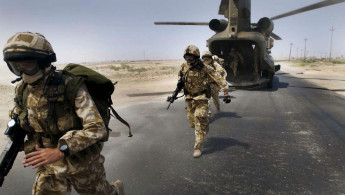British soldier confesses 'mercy killings' of Iraqi troops
Former SAS sergeant Colin Maclachlan has said he is being investigated by military police after he revealed the details of the Iraq War incident in a new book.
Executing critically wounded enemy troops is against UK military law and the Geneva Convention.
"Our motives were entirely humane," Maclachlan said, defending his actions. "I'll happily go to court, I'll happily go to jail, if you think I've done wrong," he told Mail on Sunday.
The MoD confirmed it had launched an inquiry into the killings.
The incident came to light after MoD officials were given a preview of Maclachlan's book, SAS Who Dares Wins: Leadership Secrets From The Special Forces, in which he described the moral dilemma he faced between ending the suffering of the Iraqi casualties or leaving them wounded.
The incident occurred in March 2003 at a checkpoint near the town of al-Qa'im, when SAS troops opened fire on Iraqi forces as they approached the road block.
Inspecting the scene after the attack, Maclachlan said there were a number of casualties; the men they could save were treated with tourniquets, while two Iraqi soldiers had been disembowelled and another had lost three limbs.
"These guys were pleading for us to do it, they were in agony," he told Mail on Sunday.
"The crueller thing would have been to continue their suffering."
In the book he wrote: "I didn't enjoy killing those soldiers at the checkpoint but I had to put them out of their misery. I didn't want them to suffer any more."
The inquiry is being carried out by the Special Investigation Branch (SIB) of the Royal Military Police.
An MoD spokeswoman said: "Our Armed Forces will continue to be held to the very highest standards."Credible allegations of criminal behaviour will always be investigated properly."
Prime Minister Theresa May said it would end "the industry of vexatious claims" against troops.
Britain set up the Iraq Historic Allegations Team (IHAT) to investigate allegations by Iraqi civilians of abuse by British soldiers between the US-led invasion in 2003 and 2009 when British combat troops left.
As of March 31, 2016, the team was investigating 1,374 cases, with allegations related to ill treatment, missing persons and deaths.





 Follow the Middle East's top stories in English at The New Arab on Google News
Follow the Middle East's top stories in English at The New Arab on Google News


